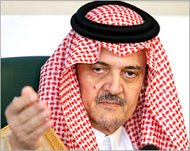Saudi Arabia has deepened a US-Arab split over Palestinian aid, joining Egypt in rejecting Washington's call to deny assistance to the new Hamas-led government. It makes sense. .Saudi Arabia, one of the biggest donors to the Palestinians, warned against the US position of stopping aid before seeing the policies Hamas adopts in government.
Foreign Minister Prince Saud al-Faisal said that all aid to Palestinians should be based on the humanitarian needs. That contrasts with the US, which has said it will continue humanitarian aid but cut off assistance to a government led by a group it considers a terrorist organisation.
He said that the kingdom affirmed its complete commitment to avoid jumping to make prejudgments. Saudi Arabia hopes that international aid for the Palestinian people should be linked only with the pressing humanitarian need of this people. Stopping aid for a sewerage system infrastructure, which is the sort of project the US wants to be starved of funding, was effectively denying Palestinians humanitarian help, he added.
Saudi Arabia's rejection comes a day after Rice was similarly rebuffed by another Arab ally, Egypt, which is a key regional influence on positions toward the Palestinians even though it is not a large donor.
Both Saud and Ahmed Aboul Gheit, the Egyptian Foreign Minister, said the world should not prejudge Hamas, signalling that the Arab world, like some European countries and Russia, is hedging its bets about whether and when to sever financial ties that keep the cash-strapped Palestinian government afloat.
The Saudis told the US that they plan to continue sending approximately $15 million a month to the Palestinian government.
Rice heads to the United Arab Emirates on Thursday for a meeting with ministers from Gulf countries and was expected to hear the same.
The Palestinian government needs about $1.8 billion in aid each year and officials in the interim government say it is heading for a financial crisis.
Hamas has so far been unperturbed by pressure to change its anti-Israel stance and says threats to stop aid are blackmail.
The United States has sought to isolate Hamas since it won a parliamentary election last month.
It has won backing from most allies, including from Saudi Arabia and Egypt, to press the group to reverse its long-held doctrine and look for peace with Israel. However, despite hours-long meetings with regional leaders, Rice's Middle East tour has underscored the distance between the United States and its allies to press Hamas.
Israel froze the transfer of about $50 million in tax money it collects for the Palestinians each month, its first response to the inauguration of the new Hamas-led parliament Saturday Feb 18.
Foreign Minister Prince Saud al-Faisal said that all aid to Palestinians should be based on the humanitarian needs. That contrasts with the US, which has said it will continue humanitarian aid but cut off assistance to a government led by a group it considers a terrorist organisation.
He said that the kingdom affirmed its complete commitment to avoid jumping to make prejudgments. Saudi Arabia hopes that international aid for the Palestinian people should be linked only with the pressing humanitarian need of this people. Stopping aid for a sewerage system infrastructure, which is the sort of project the US wants to be starved of funding, was effectively denying Palestinians humanitarian help, he added.
Saudi Arabia's rejection comes a day after Rice was similarly rebuffed by another Arab ally, Egypt, which is a key regional influence on positions toward the Palestinians even though it is not a large donor.
Both Saud and Ahmed Aboul Gheit, the Egyptian Foreign Minister, said the world should not prejudge Hamas, signalling that the Arab world, like some European countries and Russia, is hedging its bets about whether and when to sever financial ties that keep the cash-strapped Palestinian government afloat.
The Saudis told the US that they plan to continue sending approximately $15 million a month to the Palestinian government.
Rice heads to the United Arab Emirates on Thursday for a meeting with ministers from Gulf countries and was expected to hear the same.
The Palestinian government needs about $1.8 billion in aid each year and officials in the interim government say it is heading for a financial crisis.
Hamas has so far been unperturbed by pressure to change its anti-Israel stance and says threats to stop aid are blackmail.
The United States has sought to isolate Hamas since it won a parliamentary election last month.
It has won backing from most allies, including from Saudi Arabia and Egypt, to press the group to reverse its long-held doctrine and look for peace with Israel. However, despite hours-long meetings with regional leaders, Rice's Middle East tour has underscored the distance between the United States and its allies to press Hamas.
Israel froze the transfer of about $50 million in tax money it collects for the Palestinians each month, its first response to the inauguration of the new Hamas-led parliament Saturday Feb 18.

No comments:
Post a Comment